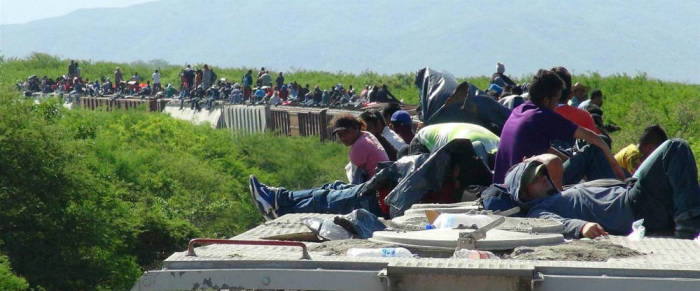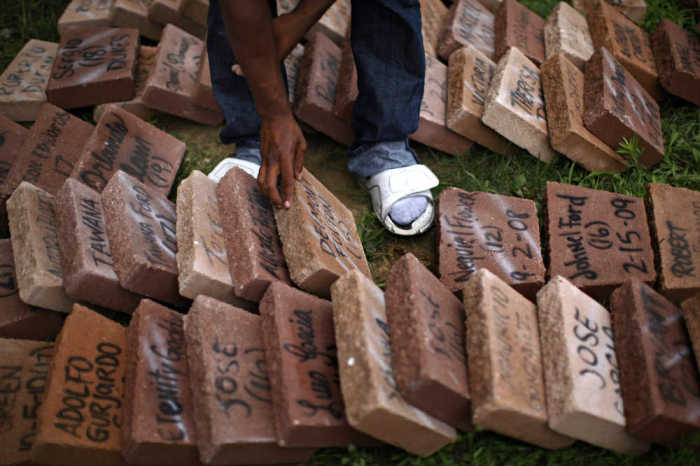Christians Playing it Too Safe? Chicago Megachurch Pastor Says Leaders Paralyzed by Fear, Unwilling to Stick Necks Out for Marginalized
Wilfredo De Jesus of New Life Covenant Church in Chicago Talks New Book 'In the Gap,' Politics, Immigration

CP: Touching on immigration a bit, I know you've been very involved in that and the most recent issue that has been highlighted is unaccompanied immigrant children entering the U.S. illegally and their treatment. What are you involved in right now, and what is your heart on the issue?
De Jesus: My heart with comprehensive immigration reform is this. I've travelled 16 cities fighting for immigration reform. I'm Puerto Rican, I could take the side of, 'Hey, this is not my issue.' But the reality is, this is a moral issue, this a moral decadence that's happened in our society. When you think about the unaccompanied minors, and they travel from 1,460 miles from Guatemala through Mexico, to the borders of the United States. Why? Why would a 10-year-old risk their life on a train, and to get through and be raped and be robbed through Mexico and get to our borders? Unless what they're going through in their homes in their particular countries, it's even as risked. Then they come to our borders, and then we treat them as if they were animals.
I went to Texas to a prison where there were almost 400 undocumented women who were waiting for deportation. I went there with my wife, and I apologized on behalf of the country and how we were treating them. Over 87 percent of the women were Evangelicals. They're not murderers, they're not rapists, they're not drug dealers. Yet, we incarcerate them. It's really discouraging. So as an Evangelical, I have to stand in the gap for them. They're being told to sit down and to be quiet. I have to speak up.
CP: I'm going to read you the most-agreed with comment left by one of our readers on a Christian Post article about you being named among the TIME 100 list: "Social Justice mixed with Christianity that is two different sides of religion today. Christianity is NOT about social justice it is about bringing people to GOD. Social justice is a political agenda that has no business in the church." What's your response to Christians coming from that angle, who don't see it as you see it?
De Jesus: It's just unfortunate. When you think about social justice, unfortunately you've got people who have created it on a political, that I may agree with. However, throughout the Bible you'll see justice and social justice being taken… Jesus with the adulterous woman, he brought justice to the situation. They wanted to killer, and yet he stood in the gap for her. So when you've got Christians saying that these are two opposite things or they should not be mixed together. That one is political and one is Christian, I would disagree with that comment because I'm about not just the thousands that are in my church, I'm about taking care of the people that are outside of my church. The Gospel has to be reached to those people. So in my community, I don't just represent the 17,000. I represent the 72,000 that live in my community, and that they're being treated harshly. God has given us Christians a platform, and that platform cannot only be used on Sundays, it has to be used…

Yesterday, I'm marching in the streets of Chicago against violence. Two hundred and forty people have died just alone in the city of Chicago; 11 in my community. And I'm marching through the community. It was just hundreds and hundreds and hundreds of people marching with us, and children. The church is the tip of the spear. The Bible says that the church is the head, not the tail. So if you don't engage the justice part, then we're just taking up corners in our cities, and not really caring for the wellbeing of the entire community, not just the 60 or the 100 or the thousands that come to our churches. I see myself as a pastor not just for those who come on Sunday, but to stand for the kid who does not come to my church, and fight for him. That's justice.
CP: I read an article where you said something to the effect of that the only way the Republican Party can woo Evangelical Latinos, which is a major block now, is through immigration reform.
De Jesus: What I suggested, or what I said was we Christians, that we should neither represent the donkey nor the elephant. We represent the lion from the tribe of Judah. However, the Republican Party is not a Christian party, or the Democratic Party. What I suggested was they lost the election because the Republican Party did not address immigration.
When (Sen. John) McCain was running against Barack (Obama), it was McCain at first when he was a senator, that he presented a bill for immigration reform. But then he becomes a presidential candidate and then he slips on us on this issue. So I suggested and said the Republican Party lost the election on this issue of immigration because they put our people to the side.
CP: What are some of the issues for Latino Evangelicals when it comes to lack of trust or confidence in the Republican Party, especially now with it trying to rebrand itself in a way?
De Jesus: I think the Republican Party and the Democratic Party, both groups have really deceived...they have a trust problem. These politicians, they have a trust problem. For the Republican Party to win the trust of Evangelicals… We're just no longer just pro-choice and pro-choice and the sanctity of marriage — which I do believe in the sanctity of marriage and I'm pro-life as an Evangelical. However, when you've got 65 million Latinos who are Americans and we're saying, 'Hey, we're neither the Republican or the Democratic. We're for life, we're for about fighting for justice for everybody.' When you have a party like the Republicans at one time, you know we had our views closer to them than the Democrats. Back in the day, maybe 30, 40 years ago, there was a group as a Republicans you thought, 'Hey, this was the Christian group, this was the conservative...' They've lost their ways, the Republican Party. They've got to do a lot to win the trust, not only of just Hispanics, but the entire nation.
CP: Any final thoughts?
De Jesus: I would encourage every leader and every pastor to empower the laypeople. It would be the laypeople that will galvanize in our streets and bring the message of hope. We can't do it alone. So we have to give power away and we have to trust the lay people, like Nehemiah.
Online: http://inthegapbook.com/




























